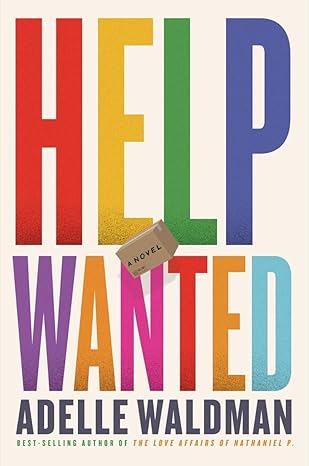
HR folks spend their days navigating sexy stuff like organizational policies, metrics, performance reviews and trying to understand AI. But what they should do – and the “care of whom” where they should focus their time – is people.
I recently read Help Wanted: A Novel by Adelle Waldman – a compelling, funny, sad, and deeply insightful novel about the humanity behind every employee’s ID number or nestled alongside the badge they use to clock-in when they start their shift.
This is not a “business book” – not sure I’ve read one of those in quite some time. Rather, it’s a story about human beings in all their messy glory – complete with their quirks, fears, ambitions, dreams and personal struggles. Set in a large chain “big box” store called Town Square (I kept debating with myself whether it was WalMart or Target) in upstate NY, the book is about the lives of staff members, working the early shift. These members of Team Movement empty the trucks, organize the merchandise, stock the shelves, and head out (often to a 2nd job) before the store opens for the day. There is also, obviously, a “Corporate” office filled with various and assorted Vice Presidents and decision makers who, with a hastily typed email, can drastically alter the lives of every employee at location #1512.
Oh, and, naturally, all the employees at Town Square (except managers) have been reduced to part time so as to ensure they remain ineligible for benefits. Of course.
THIS is the kind of book that HR professionals (and business owners and leaders) should devour. Not only is there some good and highly relatable storytelling, there are also critical lessons about how we work with each other in the workplace…and some of the self-inflicted wounds we give ourselves. This was truly one of my favorite workplace/HR reads since Bullshit Jobs: A Theory by David Graeber. (another book I recommend over and over again to HR folks).
Why should you read Help Wanted?
When we put on our HR hats (or cardigans and pearls) and slip into HR-mode at work, we often default to looking at employees through the lens of processes and systems: Why are retention rates dropping? How can we create better career pathways? What benefits program will ensure engagement? What can I put on my scorecard to share with the C-Suite? Blah Blah blah.
But what Waldman so beautifully illustrates is that employees are complex, messy, and gloriously human. They are so much more than engagement scores or flight-risk metrics. They are individuals whose motivations, relationships, and histories shape their decisions in ways we will NEVER (ever) be able to fully predict or control.
The book forces us to step back and remember that our work isn’t about crafting the perfect initiative or, God help us – the perfect “HR program”. Rather, we should think about how we can understand and support people in their imperfect and multifaceted lives.
My Top Takeaways
Misguided Corporate Initiatives: Fixing Symptoms, Not Systems
Throughout the book, we see characters struggle in workplaces designed with good intentions but flawed execution. It’s a stark reminder of how often organizations focus on the symptoms of a problem – like low morale or high turnover – without addressing the systemic issues driving them.
How do we fix this? First of all make sure we’re actually listening to employees – about HOW to do the work or WHAT conditions are satisfiers vs. de-motivator – rather than simply assuming we know what they need or want. (We’re super good at those assumptions).
The Personal Nature of Work Decisions
One of the “themes” I picked up on in Help Wanted is the realization that no matter how much “data” we collect, we’ll never ever EVER fully understand why people stay at or leave a job. For some, it’s about ambition; for others, it’s about a sense of belonging. For many, it’s deeply personal: a manager’s dismissive comment, a feeling of stagnation, or a need for something more.
Sure…we should strive to understand pattens and trends. But we also need to realize that individual employees make highly personal decisions …and they will never ever EVER vocalize them to you. And all the programs and surveys and data aggregators in the world will never be able to account for this variability.
Humanity and Empathy as a Core Leadership Competency
And you know what? I was struck when reading this book, how deeply I cared about these characters. I was super invested in their struggles, missteps, decisions and triumphs.
In that respect, the book was a bit like a mirror – reflecting the humanity that we often overlook in the REAL corporate/HR world. Why do we often forget, in real-life workplaces, that every individual is a world unto themselves – with a constellation of experiences, values, and needs that influence their work lives?
As HR professionals, it’s our job to honor their humanity. Not to fix it, control it, or even to fully understand it. Rather, it’s about creating environments where humanness can thrive.
If we want to build better workplaces, maybe we have to start by seeing the people in them – not just the skills they bring or the roles they fill. Are we designing workplaces for policies … or for people?
